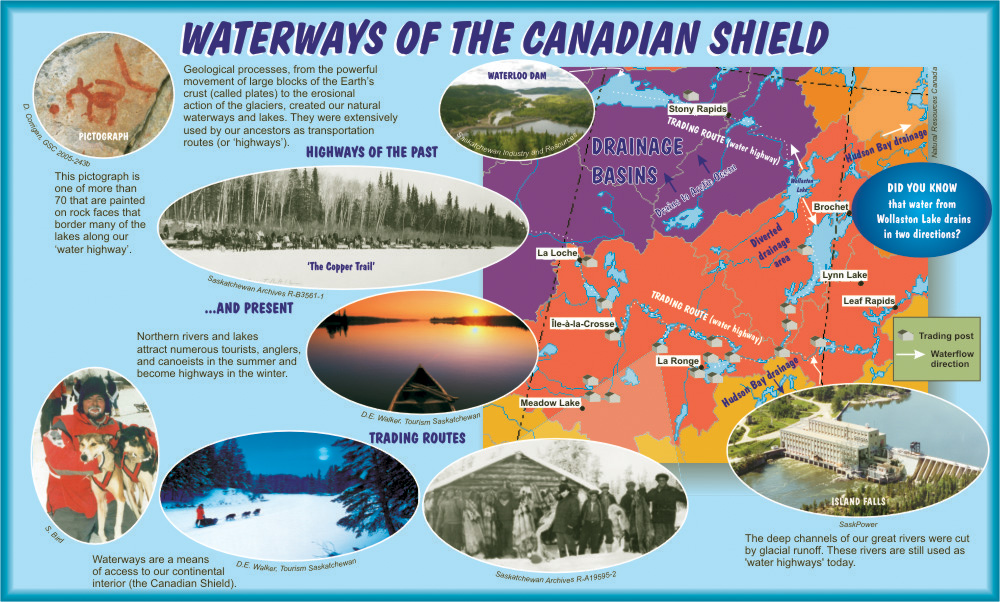Is Western Separation Realistic? A Saskatchewan Perspective

Table of Contents
Economic Viability of an Independent Western Canada: The Saskatchewan Factor
Saskatchewan's economy, heavily reliant on resource extraction – potash, oil, and agriculture – significantly shapes its perspective on Western separation. The province's economic success is intrinsically linked to its position within the Canadian federation.
Resource Dependence and Diversification
Saskatchewan's prosperity depends on robust interprovincial and international trade. An independent Western Canada would face considerable challenges:
- Dependence on interprovincial trade and export markets: A significant portion of Saskatchewan's agricultural and resource products are currently consumed or exported through other Canadian provinces. Severing these ties could drastically impact the provincial economy.
- Potential loss of federal resource revenue transfers: Saskatchewan receives substantial federal funding related to resource management and development. Separation would likely eliminate these crucial transfers, creating a significant budgetary shortfall.
- Need for significant investment in infrastructure and diversification strategies: An independent Western Canada would necessitate major investments in new infrastructure, including customs and border control, to facilitate international trade. Diversifying the economy beyond resource extraction would be critical but require substantial long-term planning and investment.
Financial Implications of Separation
The financial implications of Western separation for Saskatchewan are potentially daunting:
- Estimated cost of establishing a separate central bank and financial institutions: Creating a new banking system and financial infrastructure would be incredibly expensive and time-consuming.
- Impact on existing trade agreements and international relationships: Negotiating new trade agreements with existing partners would be complex and could result in trade barriers and reduced market access.
- Potential credit rating downgrade and increased borrowing costs: The financial uncertainty surrounding separation could lead to a credit downgrade, resulting in higher borrowing costs for the newly independent Western Canada, including Saskatchewan.
Political and Social Ramifications of Western Separation for Saskatchewan
The political and social ramifications of Western separation for Saskatchewan are multifaceted and potentially destabilizing.
Interprovincial Relations and Potential Conflicts
Separation would inevitably lead to complex negotiations with other Western provinces and the rest of Canada:
- Disputes over resource rights and royalties: Conflicts over the ownership and distribution of shared resources like water and energy could arise, potentially leading to protracted legal battles.
- Border demarcation and customs issues: Establishing and maintaining borders between a separated Western Canada and the rest of Canada would require significant resources and could disrupt trade and travel.
- Sharing of federal assets and liabilities: The division of federal assets and liabilities, including debts and infrastructure, would be a highly contentious and potentially lengthy process.
Social and Cultural Impacts
The social and cultural fabric of Saskatchewan could be significantly impacted by Western separation:
- Impact on immigration policies and multiculturalism: Establishing new immigration policies would be necessary, potentially impacting Saskatchewan's multicultural identity.
- Potential social unrest and political polarization: The separation process itself could lead to increased social and political division within the province.
- The impact on interprovincial migration and family ties: Separation could disrupt established family and social networks across provincial borders.
Public Opinion and Political Landscape in Saskatchewan Regarding Western Separation
Understanding the public sentiment and political landscape in Saskatchewan is crucial in analyzing the feasibility of Western separation.
Polling Data and Public Sentiment
Recent polls reveal mixed public sentiment on Western separation in Saskatchewan. While a significant portion of the population feels marginalized within the Canadian federation, support for complete separation is not universally strong. More data is needed to ascertain the degree of support for varying degrees of autonomy.
- Further research is needed to fully understand the nuances of public opinion on this complex issue. Detailed breakdowns by demographics and regions within Saskatchewan would provide a more comprehensive picture.
Political Parties and their Stances
Saskatchewan's political parties hold diverse positions on greater provincial autonomy, ranging from advocacy for increased federal transfers to more nuanced approaches to addressing Western alienation. None currently advocate for outright Western separation.
- The platforms and official statements of these parties should be closely examined to gauge their current and potential future positions on this issue.
Conclusion: The Reality of Western Separation for Saskatchewan
While concerns about Western alienation are genuine and deeply felt in Saskatchewan, the economic, political, and social complexities of Western separation present formidable obstacles. The economic dependence on interprovincial trade, the potential loss of federal funding, and the challenges of establishing a new independent state highlight the significant challenges. While increased provincial autonomy may offer some benefits, the practical hurdles of complete separation from Canada are substantial. Further research and open dialogue about Western separation, Saskatchewan autonomy, and the future of Western Canada are essential to navigate this complex issue responsibly. Engage in informed discussions and contribute to the ongoing debate surrounding the various paths toward a more equitable and prosperous future for Saskatchewan.

Featured Posts
-
 The Goldbergs A Deep Dive Into The Shows Best Episodes And Running Gags
May 22, 2025
The Goldbergs A Deep Dive Into The Shows Best Episodes And Running Gags
May 22, 2025 -
 First Look Echo Valley Images Preview Sydney Sweeney And Julianne Moores Upcoming Thriller
May 22, 2025
First Look Echo Valley Images Preview Sydney Sweeney And Julianne Moores Upcoming Thriller
May 22, 2025 -
 Sound Perimeter Musics Impact On Our Lives
May 22, 2025
Sound Perimeter Musics Impact On Our Lives
May 22, 2025 -
 Ancelotti Den Klopp A Real Madrid Icin Dogru Secim Mi
May 22, 2025
Ancelotti Den Klopp A Real Madrid Icin Dogru Secim Mi
May 22, 2025 -
 Court To Decide On Ex Tory Councillors Wifes Racial Hatred Tweet Appeal
May 22, 2025
Court To Decide On Ex Tory Councillors Wifes Racial Hatred Tweet Appeal
May 22, 2025
Latest Posts
-
 Switzerland Condemns Pahalgam Terror Attack Official Statement From Foreign Minister Cassis
May 22, 2025
Switzerland Condemns Pahalgam Terror Attack Official Statement From Foreign Minister Cassis
May 22, 2025 -
 Combate Las Enfermedades Cronicas Este Superalimento Es Tu Mejor Aliado Para Un Envejecimiento Saludable
May 22, 2025
Combate Las Enfermedades Cronicas Este Superalimento Es Tu Mejor Aliado Para Un Envejecimiento Saludable
May 22, 2025 -
 Mas Alla Del Arandano El Superalimento Clave Para Prevenir Enfermedades Cronicas
May 22, 2025
Mas Alla Del Arandano El Superalimento Clave Para Prevenir Enfermedades Cronicas
May 22, 2025 -
 Superalimentos Para La Salud Por Que Este Supera Al Arandano En La Prevencion De Enfermedades
May 22, 2025
Superalimentos Para La Salud Por Que Este Supera Al Arandano En La Prevencion De Enfermedades
May 22, 2025 -
 El Superalimento Que Supera Al Arandano Beneficios Para La Salud Y La Longevidad
May 22, 2025
El Superalimento Que Supera Al Arandano Beneficios Para La Salud Y La Longevidad
May 22, 2025
